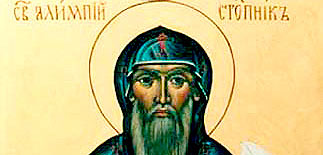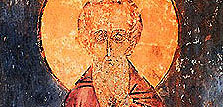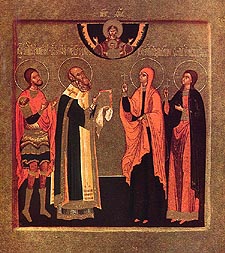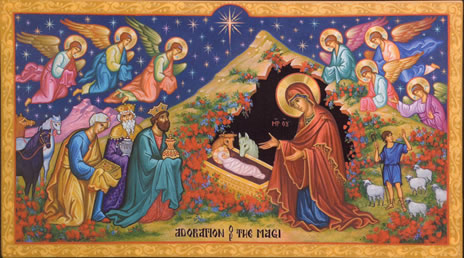Theology
Apostle Andrew, the Holy and All-Praised First-Called
12. December 2018 - 13:51 The Holy Apostle Andrew the First-Called was the first of the Apostles to follow Christ, and he later brought his own brother, the holy Apostle Peter, to Christ (John 1:35-42).
The Holy Apostle Andrew the First-Called was the first of the Apostles to follow Christ, and he later brought his own brother, the holy Apostle Peter, to Christ (John 1:35-42).
The future apostle was from Bethsaida, and from his youth he turned with all his soul to God. He did not enter into marriage, and he worked with his brother as a fisherman. When the holy Prophet, Forerunner and Baptist John began to preach, Saint Andrew became his closest disciple. Declaring Christ to be the Lamb of God, Saint John the Baptist himself sent to Christ his own two disciples, the future Apostles Andrew and John the Theologian.
Venerable Alypius the Stylite of Adrianopolis
9. December 2018 - 13:04 

Saint Alypius the Stylite was born in the city of Adrianopolis in Paphlagonia.
His mother, a Christian, was widowed early, and she sent her son to be educated by Bishop Theodore. She distributed her substance to the poor, then began to live an ascetic life near the church as a deaconess.
Saint Alexander Nevsky
6. December 2018 - 9:51 The Holy Prince Alexander Nevsky was born on May 30, 1220 in the city of Pereslavl-Zalessk.
The Holy Prince Alexander Nevsky was born on May 30, 1220 in the city of Pereslavl-Zalessk.
His father Yaroslav II, Theodore in Baptism (+1246), “a gentle, kindly and genial prince”, was the younger son of Vsevolod III Large Nest (+ 1212), brother of the Holy Prince Yuri Vsevolodovich (February 4). Saint Alexander’s mother, Theodosia Igorevna, a Ryazan princess, was Yaroslav’s third wife. Their older son was the Holy Prince Theodore (June 5), who departed to the Lord at age fifteen. Saint Alexander was their second son.
Twenty-seventh Sunday after Pentecost The Healing of the Woman with a Spirit of Infirmity
2. December 2018 - 14:05 (Lk. 13:10-17) -From the Explanation of the Gospel of St. Luke by Blessed Theophylact, Archbishop of Ochrid
(Lk. 13:10-17) -From the Explanation of the Gospel of St. Luke by Blessed Theophylact, Archbishop of Ochrid
10-17. And He was teaching in one of the synagogues on the Sabbath. And, behold, there was a woman who had a spirit of infirmity eighteen years, and was bent over, and could in no wise straighten herself. And when Jesus saw her, He called her to Him, and said unto her, Woman, thou art loosed from thine infirmity. And He laid His hands on her: and immediately she was made straight, and glorified God. And the ruler of the synagogue answered with indignation, because Jesus had healed on the sabbath day, and said unto the people, There are six days in which men ought to work: in them therefore come and be healed, and not on the sabbath day. The Lord then answered him, and said, Thou hypocrite, doth not each one of you on the sabbath loses his ox or his ass from the stall, and lead it away to watering? And ought not this woman, being a daughter of Abraham, whom Satan hath bound, lo, these eighteen years, be loosed from this bond on the sabbath day? And when He had said these things, all His adversaries were ashamed: and all the people rejoiced for all the glorious things that were done by Him.
The woman suffered from this affliction as a result of a demonic assault, as the Lord Himself says, This woman, whom Satan hath bound, lo, these eighteen years.
St. Gregory the Wonderworker of Neocaesarea
30. November 2018 - 16:24 Saint Gregory the Wonderworker, Bishop of Neocaesarea, was born in the city of Neocaesarea (northern Asia Minor) into a pagan family. Having received a fine education, from his youth he strived for Truth, but the thinkers of antiquity were not able to quench his thirst for knowledge.
Saint Gregory the Wonderworker, Bishop of Neocaesarea, was born in the city of Neocaesarea (northern Asia Minor) into a pagan family. Having received a fine education, from his youth he strived for Truth, but the thinkers of antiquity were not able to quench his thirst for knowledge.
For the continuation of his studies Saint Gregory went to Alexandria, known then as a center for pagan and Christian learning. The youth, eager for knowledge, went to the Alexandrian Catechetical School, where the presbyter Origen taught. Origen was a famous teacher, possessing a great strength of mind and profound knowledge. Saint Gregory became a student of Origen. Afterwards, the saint wrote about his mentor: “This man received from God a sublime gift, to be an interpreter of the Word of God for people, to apprehend the Word of God, as God Himself did use it, and to explain it to people, insofar as they were able to understand it.” Saint Gregory studied for eight years with Origen, and was baptized by him.
Nativity Fast
27. November 2018 - 16:40 Make ready, O Bethlehem: let the manger be prepared, let the cave show it's welcome. The truth has come, the shadow has passed away...
Make ready, O Bethlehem: let the manger be prepared, let the cave show it's welcome. The truth has come, the shadow has passed away...
On November 15th we begin the forty day period where we proclaim the miracle of God becoming

